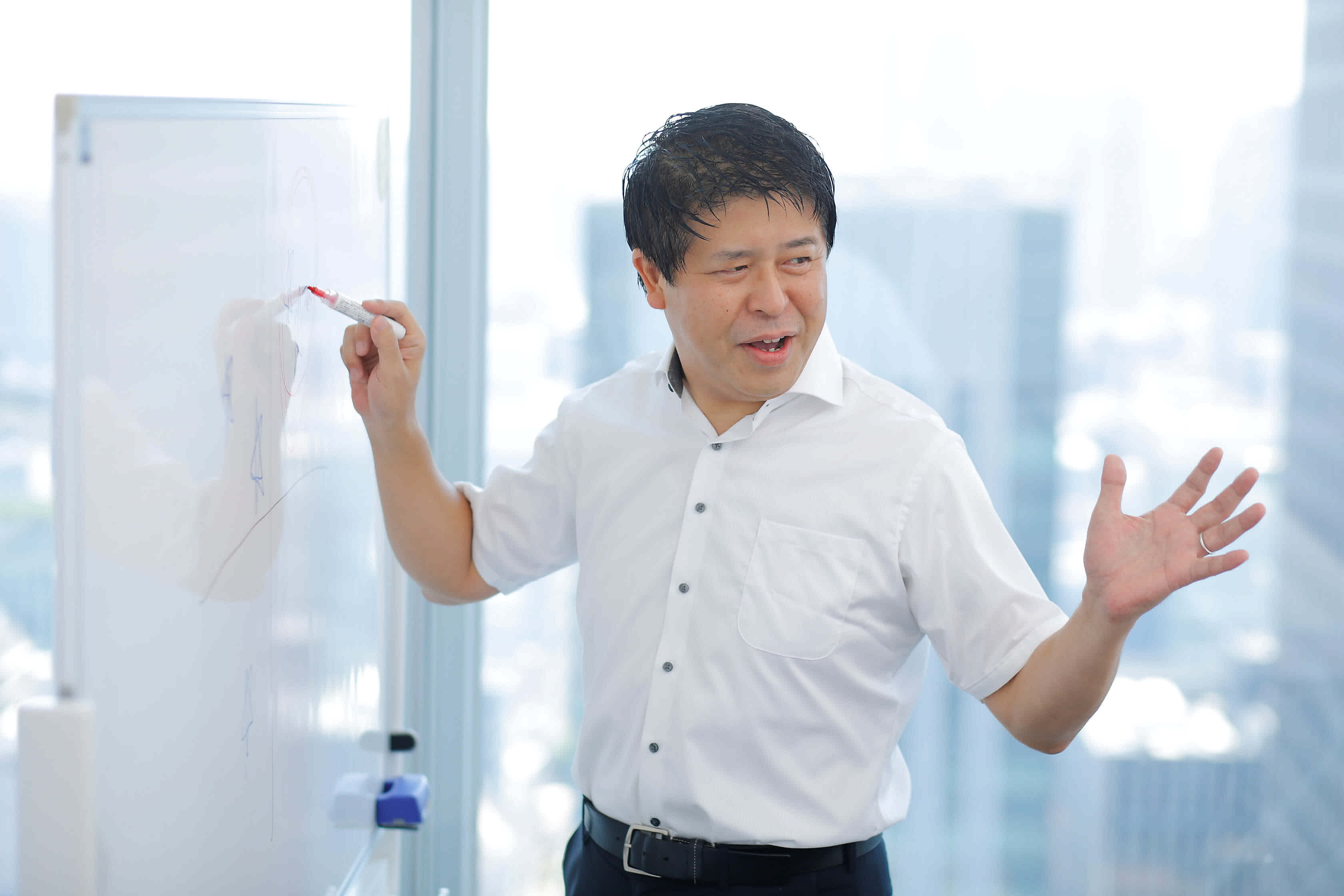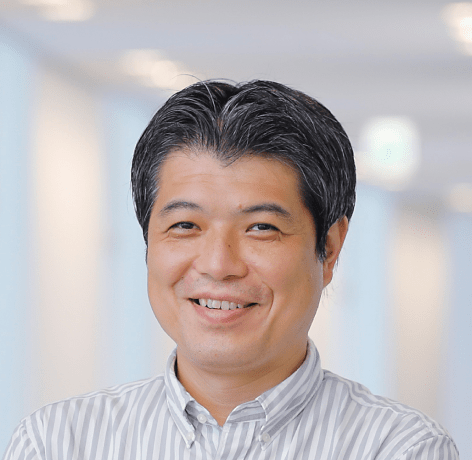Looking to Realize Advanced Global Tax Management on Par with Europe and North America, and to Lead the Evolution of Corporate Functions of Japanese Companies
Head of Tax Management Dept.
Takahiro Azuma
Looking to realize advanced tax management that balances both high level “defensive” and “offensive” elements.
The Tax Management Department has two main roles. The first is the defensive element of tax compliance. The need to prevent filing errors and unpaid taxes goes without saying. As the company expands its business globally and cross-border transactions increase between group companies, we also need to secure a fair distribution of profits based on fair price decisions. If faults are found during a tax audit, we pay a heavy price in the form of additional taxes or reputational risks. Therefore, our most critical role is to file accurate tax returns based on a clear tax policy and reduce tax-related risks.
At the same time, we must improve tax efficiency to realize continuous business growth and maximize shareholder value. This offensive element of tax planning is also one of our critical roles. When acquiring a company, restructuring an organization, or starting a new business, tax efficiency is greatly affected by factors such as how funds are invested, how capital is structured, and in which country the functions, funds and risks exist. In European and North American companies, tax management is one of the most important agendas in business management. It is not unusual to find companies with tax departments staffed by a thousand or so employees. This goes to show just how big an impact tax efficiency has on business management. As a technology company operating on a global scale, we must compete on the same stage as European and North American companies, including the GAFA companies. We cannot do this without a strong global tax organization that can oversee tax for the entire Recruit Group and optimize tax efficiency by discussing, proposing and executing the best methods.
Our aim is to indicate a clear tax policy and file accurate tax returns with a focus on legal compliance and business rationale. The Tax Management Department currently handles tax consultations requests received from various group companies while simultaneously monitoring and appropriately handling the tax situation in over 60 countries where Recruit operates in, according to each country’s rules and schedules. At the same time, we participate in various new projects and lead discussions on how to invest funds and build a capital structure. For example, when planning an M&A project, many Japanese companies hire an external professional firm and rely on them to examine the structure, but at Recruit, we always do the examination ourselves. The Tax Management Department gets involved right from the beginning of the project. We conduct multiple simulations on our own and decide on the best structure before asking a professional firm to assess the risks. By doing so, decisions that significantly impact management can be made soundly according to our wishes and not left in the hands of outside parties.
There is a growing expectation of headquarters, particularly in recent years, to visualize and accurately understand the tax situation of the entire Recruit Group and ensure that it can be explained at any time. To this end, we spent several years unifying our tax accountant corporations around the world to introduce our Global Tax Management System. Our efforts are aimed at creating a unified organization in which Specialist System Partners can be organically connected across borders. This series of initiatives to realize high-quality tax management with a small number of exceptionally talented people was recognized as an outstanding case and received multiple awards from an international trade magazine in the tax industry. We take pride in having built an advanced tax organization in Japan. Going forward, we will continue to take our defensive and offensive work to even higher levels so that we can get ahead on the global stage where tax management skills are directly linked to our competitive strength.

Our mission is to continue being a frontrunner leading the evolution of corporate structure of companies throughout Japan.
I previously worked overseas for nine years in the US and Australia. As a member of senior management in local subsidiaries, I was involved in group company restructurings, M&A projects, and the rebuilding of deficit companies. Back then, I was deeply concerned about how outdated the corporate functions of Japanese companies were. I wanted to eventually join a Japanese company with social influence to demonstrate the kind of corporate functions that can win on a global stage. Other companies would then be able to replicate the structure, which would revitalize Japan as a whole. It was right around that time that I met Recruit, which was preparing for an IPO and expanding globally. They said they wanted to create a global tax organization, which was exactly what I wanted to do, so I decided to join. That was the beginning of the current Tax Management Department. Back then, neither Recruit’s management nor its business leaders knew much about tax affairs, but as the company went public and expanded globally, they began to understand more. Today, when somebody wants to start something new, they’re told to first consult the Tax Management Department. Although it took time, I believe we were able to create an advanced and unrivaled tax organization because we set ambitious goals and started from scratch.
Recently, various companies have increasingly started to consult us about how to create a tax organization. There have also been cases where members who worked with us for many years were invited to join other companies as managers, where they are striving to replicate how we built our organization. Recruit has always been described as a company that produces skilled human resources, so it makes me happy that we are able to embody that corporate culture in the field of tax talent as well. We are still connected to the “alumni” of our department, and we sometimes consult or exchange opinions with each other as we strive toward the same goal of strengthening the corporate functions of Japanese companies. Of course, I hope new employees will work with us for a long time, but if they leverage what they learn here, they can thrive in any company. That will broaden our network of peers connected both inside and outside of Recruit, which is a positive outcome as well. That’s the sort of organization I wish for us to be.

Working on taxes in a business company means thinking from a management perspective and being involved in decision-making.
Professional firms, such as audit or tax accountant corporations, are expected to have in-depth knowledge so that they can check and pick up on even the smallest of risks in their respective fields. However, tax work in business companies requires us to utilize such professional knowledge, but to also probe even more and heighten our ability to detect business risks. We must truly think from a management perspective by consolidating concerns from various fields, including sales, development, legal affairs, human resources, accounting, finance, and general affairs, and then be involved in the decision-making process.
As the global headquarters’ tax department, everyone in the Tax Management Department is working to enhance their expertise as they take on the responsibility of overseeing all of Recruit’s group companies. This is done through close cooperation with tax teams on the business side in the US, Ireland and the Netherlands; with finance headquarters in London and Ireland; and with local tax accountant corporations in various countries worldwide. At the same time, our members are also concurrently in charge of Matching & Solutions business tax affairs, which has its headquarters in Japan. As personnel in charge of the business’s taxes, they are required to engage with people in fields, such as engineering and sales, who have no knowledge of taxes. Doing so provides them with opportunities to acquire business understanding and communication skills that are necessary when they need to give explanations or advice to members of management in a simple and concise manner. I firmly believe that we are able to provide very attractive opportunities to people who wish to work in close proximity to businesses, take on roles that are directly linked to management, or acquire skills in both these areas at the same time. Japan is said to be an underdeveloped country in terms of tax practices. To remedy this and continue challenging ourselves to creating advanced tax practices that are equal to those in Europe and North America, we still need to become more powerful. I hope that people with high aspirations, and who agree with our sentiments and concepts, will join our team so that we can pave a path forward together.

Takahiro Azuma
Head of Tax Management Dept.
Aug 5, 2022
- * This article is based on information available at the time of publication.





